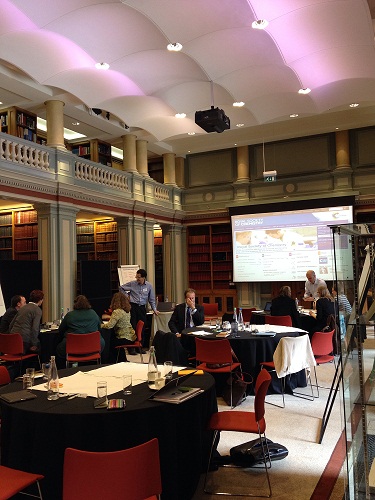SCONUL e-monthly April 2014 had [links added by me]
One-day workshop on open access, London, 20 May BMJ, IOP Publishing, Royal Society Publishing and the Royal Society of Chemistry are working in collaboration with the Research Information Network (RIN) to run a one-day workshop on open access (OA), in order to understand how institutions have handled changes over the last year since RCUK introduced their OA mandate. As part of the day, the publishers will provide brief updates on their OA activities over the past year and plans going forward, but the main focus of the workshop is to understand your experiences and priorities…. The workshop is aimed primarily at library staff with responsibility for OA policy and practice.
We met in the lovely Royal Society of Chemistry Library 
There were library people working on Open Access from around England, Wales and Northern Ireland.
The Open Access friendly publishers each presented where they were up to and the challenges they had making their systems work well. They were grappling with learned society memberships, papers with many authors (I know of particle physics papers with ~1000 authors), differences in approach to OA in different countries, collecting Article Processing Charges (APC), subscription charges and open accounting to reassure people worried about “double dipping” and communicating with researchers, libraries and accounts payable at universities. Some publishers are increasing their Gold OA rate significantly through voucher schemes such as Gold for Gold
One of the issues we shared was linking authors to institutions. At the moment many publishers used a free text field for author affiliation. Perhaps a solution could involve ORCID plus either sharing institutional affiliations from ORCID or universities making available linked lists of staff and ORCID IDs. Someone shared how simply giving staff IDs was less well received than offering them.
I also mentioned that lists of businesses in Europe and elsewhere are available and could form a controlled vocabulary of research institutions both university and elsewhere.
When we formed small groups of library people to talk about what we would like from publishers we independently came up with pretty much exactly the same desires.
We all wanted researchers, publishers and libraries to communicate well through the publication process.
When someone submits a work for publication that is only known by the researcher and the publisher. We in the library don’t know what is in the process of being considered for publication; we don’t know all of what is published by researchers in our university. We’d like to in order to offer help with the process and to know what we want to preserve and promote in our repositories.
We’d like to know when something in published and get hold of the metadata and ideally the copy of the work we can archive. We’d like this to be as automated as possible. In some cases the author does not have a “final author version” since the compilation, mark-up and correction processes are done using publisher systems. We want to be clear what the rights and copyright situation is for a paper and if that changes in the future, for example through retrospective Gold OA. I want a small number of standard licenses, including what may be reused, and machine readable forms of them.
We want to be able to link publications to grants and funders.
We’d like to support and streamline the publication process: choosing a publication, submitting work, choosing a licence of the researcher’s informed choice though constrained by compliance requirements, going through selection, peer review and corrections, perhaps linked data publication, institutional archiving and then working together with the joint aim of publicising research and helping get research noticed, read and acted upon by the right people.
Any progress by any publisher is helpful to us. We don’t need to wait until all publishers make changes. Neither do we need all publishers to work with us in the same way. We can work directly with publishers or via third parties such as brokerage services or commercial offerings. We can also work on streamlining our APC payment processes in universities and making sure we are easy to communicate with.
Overall, a useful and positive meeting I think.

 Subscribe to 's posts
Subscribe to 's posts
Recent Comments